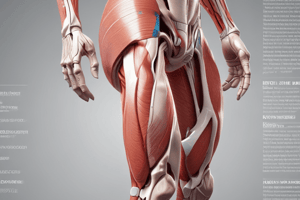Podcast
Questions and Answers
What common issue can result from hip flexor tightness?
What common issue can result from hip flexor tightness?
- Lower back pain (correct)
- Knee instability
- Ankle sprain
- Shoulder pain
Which muscle group contracts to extend the knee during the stance phase of walking?
Which muscle group contracts to extend the knee during the stance phase of walking?
- Quadriceps (correct)
- Hip flexors
- Adductors
- Hamstrings
Which exercise primarily focuses on the quadriceps and their ability to extend the knee joint?
Which exercise primarily focuses on the quadriceps and their ability to extend the knee joint?
- Leg press (correct)
- Bicep curls
- Planks
- Deadlifts
Why are quadriceps and hip flexors often mentioned together in discussions about movement?
Why are quadriceps and hip flexors often mentioned together in discussions about movement?
What can contribute to injuries in the quadriceps and hip flexors?
What can contribute to injuries in the quadriceps and hip flexors?
Why is it important to understand the role of quadriceps and hip flexors in daily activities?
Why is it important to understand the role of quadriceps and hip flexors in daily activities?
Which muscle in the quadriceps group of muscles primarily assists in flexing the hip joint?
Which muscle in the quadriceps group of muscles primarily assists in flexing the hip joint?
What is the main function of the vastus muscles in the quadriceps group?
What is the main function of the vastus muscles in the quadriceps group?
Which of the following activities heavily relies on the hip flexors muscles?
Which of the following activities heavily relies on the hip flexors muscles?
Which muscle is NOT part of the quadriceps group?
Which muscle is NOT part of the quadriceps group?
In addition to extending the knee, what other function does the rectus femoris muscle perform?
In addition to extending the knee, what other function does the rectus femoris muscle perform?
Which muscle is considered the primary hip flexor among the group of hip flexor muscles?
Which muscle is considered the primary hip flexor among the group of hip flexor muscles?
Flashcards are hidden until you start studying
Study Notes
Understanding the Front of Your Thigh
The front of your thigh is a dynamic region that houses several essential muscles responsible for movement, stability, and the appearance of your legs. This area encompasses the quadriceps muscles and hip flexors, both integral to daily activities and athletic performance.
Quadriceps Muscles
Located on the anterior (front) part of the thigh, the quadriceps, often abbreviated as quads, are a group of four muscles:
- Rectus femoris
- Vastus lateralis
- Vastus medialis
- Vastus intermedius
These muscles work together to extend the knee joint, allowing you to straighten your legs and move forward. The rectus femoris, in addition to extending the knee, also assists in flexing the hip joint, contributing to walking and running. The vastus muscles are primarily responsible for the knee extension function, and they also help stabilize the knee when loaded.
Hip Flexors
Adjacent to the quadriceps, the hip flexors are a group of muscles that help flex the hip joint, allowing you to lift your knees toward your chest or bend forward at the waist. The primary hip flexor muscle is the iliopsoas (comprising the iliacus and psoas major muscles). The rectus femoris, although part of the quadriceps, also plays a role in hip flexion.
The hip flexors are essential for activities such as walking, climbing stairs, and performing sports that require quick, explosive movements like sprinting or jumping.
Functional Interaction between Quadriceps and Hip Flexors
The quadriceps and hip flexors are not entirely independent of one another. In fact, they often work in concert to facilitate various movements, such as walking, running, and kicking. For instance, during the stance phase of walking, the quadriceps contract to extend the knee, while the hip flexors contract to lift the leg forward.
Common Injuries and Conditions
The quadriceps and hip flexors are susceptible to various injuries, such as strains, pulls, tears, and tendinitis. These injuries can occur due to overuse, muscle imbalances, poor technique, or a lack of flexibility. Hip flexor tightness is a common issue, which can lead to lower back pain and reduced range of motion in the hip joint.
Strengthening and Stretching Exercises
To maintain healthy and strong quadriceps and hip flexors, incorporate the following exercises into your fitness routine:
- Squats: Work all four quadriceps muscles, as well as the hip flexors, to improve lower body strength and flexibility.
- Leg press: Focuses on the quadriceps and their ability to extend the knee joint.
- Lunges: Develop strength, balance, and flexibility in the quadriceps and hip flexors.
- Hip flexor stretches: Hold a static stretch for 30 seconds, three times per day, for improved flexibility in the hip flexor muscles.
By understanding the role of the quadriceps muscles and hip flexors, you can better appreciate the importance of these muscles in daily activities and athletic performance. Additionally, by implementing stretching and strengthening exercises, you can maintain strong and healthy muscles, reducing your risk of injury and improving overall functional capability.
Studying That Suits You
Use AI to generate personalized quizzes and flashcards to suit your learning preferences.




